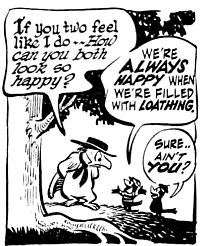
"In short, I conceive that great part of the miseries of mankind are brought upon them by the false estimates they have made of the value of things, and by their giving too much for their whistles.” (Benjamin Franklin, "The Parable of the Whistle")
To fall into despair is just a high-class way of turning into a dope. I choose to laugh, and laugh at myself no less than at others."
(Saul Bellow)
“If I, Rigoberta Menchú served only as the testament of a failed revolution, a moment in history when the highest collective ideals of liberation theology crashed headlong into the most vicious distillate of cold war anticommunism, it would be a good book, still worth reading. But what made liberation theology, along with Latin America's New Left more broadly, so potent a threat in a place as inhumane as Guatemala in the 1970s was not just its concern with social justice but its insistence on individual human dignity.”
(Greg Grandin in The Nation)
"I find film in its modern form to be quite bullying. It spoon-feeds us, which has the effect of watering down our collective cultural imagination. It is as if we are freshly hatched birds looking up with our mouths open waiting for Hollywood to feed us more regurgitated worms. The 'Watchmen' film sounds like more regurgitated worms. I for one am sick of worms. Can't we get something else? Perhaps some takeout? Even Chinese worms would be a nice change."
(Alan Moore)
“I think most illustrators are far too hard on themselves. They expect to sit down with one piece of paper and draw exactly what they have in their mind the very first time around. In my opinion this is nearly impossible. Drawing is a process that takes a long time. I like to make an analogy between a good batter in baseball and a good illustrator. A great batting average for the major leagues is “.300.” This batting average means that they get 3 hits out of ten, or get a hit 30 percent of the time. I think that this is a reasonable expectation for an artist to have as well. If I can get 3 decent drawings out of ten attempts – I feel fairly good about myself.”
(William Beachy)
“Love is to our hearts what winds are to the sea. They grow into tempests, true; they are sometimes even the cause of shipwrecks. But the winds render the sea navigable, their constant agitation of its surface is the cause of its preservation, and if they are often dangerous, it is for the pilot to know how to navigate in safety.” (Ninon de l'Enclos, Letters to the Marquis de Sévigné , VIII)
“I happen to be an anti-Stalinist and an anti-Nazi, so I don’t think that the state should be granted the right to determine historical truth.” (Noam Chomsky)
Tina Fey: [ holds up picture of Hugh Hefner and seven girlfriends ] Tonight, Playboy founder Hugh Hefner will celebrate his 75th birthday. At Hefner's side will be his seven girlfriends - Stephanie, Tiffany, Regina, Cathy, Kimberly, Buffy and, of course, Tina. Because wherever two or more whores are gathered, there's always a Tina. Now, when I first saw these women, I thought the same thing we all did - what has happened to affirmative action in this country? Hefner's dating seven blonde, white women - not a blonde pubic hair among them, might I add. Not a pubic hair among them. Come on, though - seven blondes? There's not a hot Asian woman you can throw in there? A light-skinned black woman? A deaf brunette? Something? Where's the diversity? When are we going to have a Hefner harem that looks like America? Am I really to believe that these women, each of them, offers you something unique?
Let's go over them, if you will. [ points to first girlfriend ] This one is 19, okay. Two months ago she was working at Dairy Queen, now she goes clubbing every night with Bill Maher and Don Adams. Is she better off? It's hard to say!
This one.. [ points to second girlfriend ] ..this one isn't even trying. I'm actually very disappointed in this one. What is that, a man's shirt? You are the weakest link - goodbye!
[ onto the third girlfriend ] This one doesn't even have a name anymore.. she's just "Girl". She's basically just there because she knows CPR.
[ fourth girlfriend ] This one is always next to him, always holding his hand. [ in Chinese accent ] She a numba one girlfriend! At 28, Tina is the oldest and has a two-year-old son. That must be a wonderful way to grow up, playing Fetch the Ashtray with James Caan in the Grotto, while your mom's upstairs praying for the Viagara to wear off so she can get you to the orthodontist on time. Fantastic.
These two.. [ points to next two girlfriends ] ..these two right herem these two are like this.. [ crosses fingers ] Sometimes they're like this.. [ squeezes fingers ]
[ final girlfriend ] And this one, clearly, this one is willing to do something the others will not do. Whatever the filthiest thing you can think of - it's a little worse than that, and she'll let you photograph her doing it. Gotta be the reason she's there.
But you know what? You can't condemn these woman, because at least they work together, they support each other, and how many woman can say that, right? And these women aren't doing it for the money. They're doing it because they were molested by a family friend. I salute you, Hefner ladies. You are making it work! Back to you Jimmy!
(Tina Fey)
“Three passions, simple but overwhelmingly strong, have governed my life; the longing for love, the search for knowledge, and unbearable pity for the suffering of mankind.” (Bertrand Russell)

“The word “prophet” is a very bad translation of an obscure Hebrew word, navi. Nobody knows what it means. But today they’d be called dissident intellectuals. They were giving geopolitical analysis, arguing that the acts of the rulers were going to destroy society. And they condemned the acts of evil kings. They called for justice and mercy to orphans and widows and so on. I don’t want to say it was all beautiful. Dissident intellectuals aren’t all beautiful. You read Sakharov, who is sometimes appalling. Or Solzhenitsyn. And the nivi’im were treated the way dissident intellectuals always are. They weren’t praised. They weren’t honored. They were imprisoned like Jeremiah. They were driven into the desert. They were hated. Now at the time, there were intellectuals, “prophets,” who were very well treated. They were the flatterers of the court. Centuries later, they were called ‘false prophets.’ People who criticize power in the Jewish community are regarded the way Ahab treated Elijah: You’re a traitor. You’ve got to serve power. You can’t argue that the policies that Israel is following are going to lead to its destruction, which I thought then and still do.” (Noam Chomsky)
 (And some days it takes more Stones than others...) Where Mythical Bestiary meets Contemporary Culture and Chews On Its Leg Until Covered with Slobber.
(And some days it takes more Stones than others...) Where Mythical Bestiary meets Contemporary Culture and Chews On Its Leg Until Covered with Slobber.


























